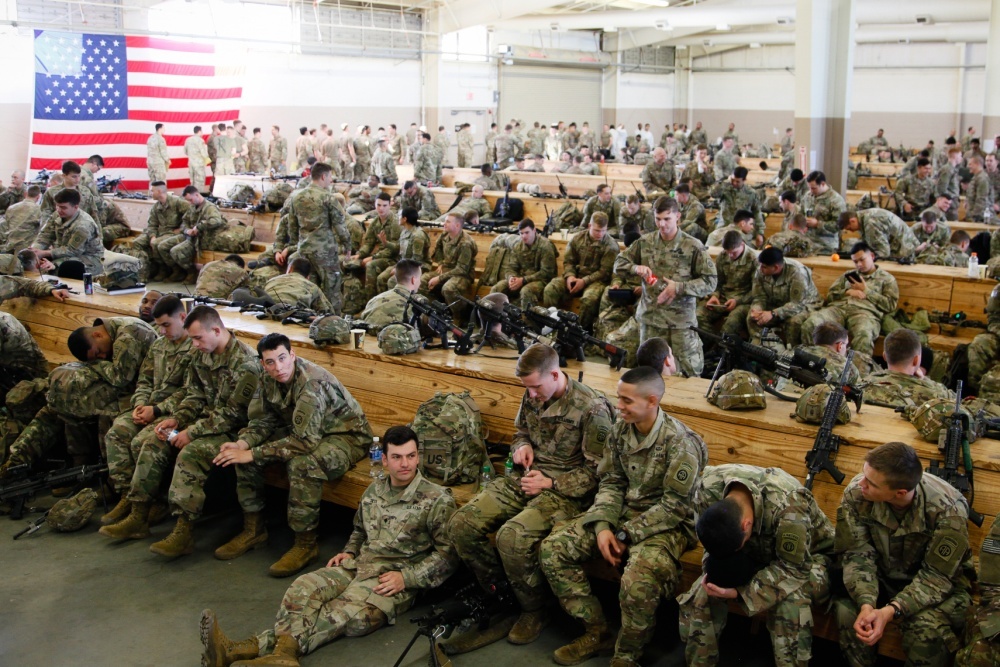How does war affect elections?

After a U.S. drone strike in Iraq killed 10 Iranian military leaders earlier this month, about 3,500 soldiers from North Carolina's Fort Bragg were sent to the Middle East. The deployment comes as U.S. elections heat up, raising questions about the impact of war on electoral politics. (U.S. Army photo by Spc. Hubert Delany III via Fort Bragg's website.)
When he was running for president in 2016, Donald Trump openly criticized Republicans and Democrats alike for getting involved in protracted wars in the Middle East. He positioned himself as the candidate who would end the war in Afghanistan, bring the troops home, and prevent the country from getting involved in more senseless conflicts.
Trump is currently considering reducing troop levels in Afghanistan, even in the absence of a deal with the Taliban. But earlier this month, he had many fearing he was opening a new front in the Middle East wars after his administration carried out a surprise drone strike in Iraq that killed 10 Iranian military leaders, including the country's top security and intelligence commander.
Which led us to wonder: How does war abroad affect elections at home?
That was the topic of a 2017 study titled "Battlefield Casualties and Ballot Box Defeat: Did the Bush-Obama Wars Cost Clinton the White House?" by Douglas Kriner, a political science professor at Boston University, and Francis Shen with the University of Minnesota Law School. They noted that a divide is growing in the U.S. between those communities whose young people are dying in wars and those whose young people are not, and whether this "casualty gap" contributed to Trump's victory.
"Even controlling in a statistical model for many other alternative explanations, we find that there is a significant and meaningful relationship between a community's rate of military sacrifice and its support for Trump," they write, attributing it to him "speaking to this forgotten part of America."
Kriner and Shen concluded that if three states key to Trump's victory — Michigan, Pennsylvania, and Wisconsin — had suffered even modestly lower casualty rates, all three could have flipped from red to blue and sent Democrat Hillary Clinton to the White House. This has important implications for foreign policy, they write:
If Trump wants to win again in 2020, his electoral fate may well rest on the administration's approach to the human costs of war. Trump should remain highly sensitive to American combat casualties, lest he become yet another politician who overlooks the invisible inequality of military sacrifice. More broadly, the findings suggest that politicians from both parties would do well to more directly recognize and address the needs of those communities whose young women and men are making the ultimate sacrifice for the country.
Researchers have also looked at the effect of war on voter participation. They include Michael Koch of Texas A&M University and Stephen Nicholson of University of California, Merced. Their 2016 study "Death and Turnout: The Human Costs of War and Voter Participation" dived into cross-national data from elections in 23 democracies over a 50-year period and survey data from the United States and United Kingdom during the Iraq and Afghanistan wars.
Their conclusion? Mounting casualties increase turnout.
More specifically, Koch and Nicholson found that voter turnout increases when a conflict results in more than 300 deaths. Large numbers of war fatalities increase voter turnout, they write, by "reaching the least politically engaged members of society." They also found that groups with a low interest in voting are more likely to be motivated to cast a ballot when there is a surge in the number of combat deaths within 60 days of the election.
But at the same time, the study found that these voting patterns do not impact the results of an election much because "for every person mobilized to vote against the conflict by casting a vote against a culpable leader, another appeared to be motivated to vote in favor of the war by supporting the culpable leader."
Tags
Rebekah Barber
Rebekah is a research associate at the Institute for Southern Studies and writer for Facing South.
